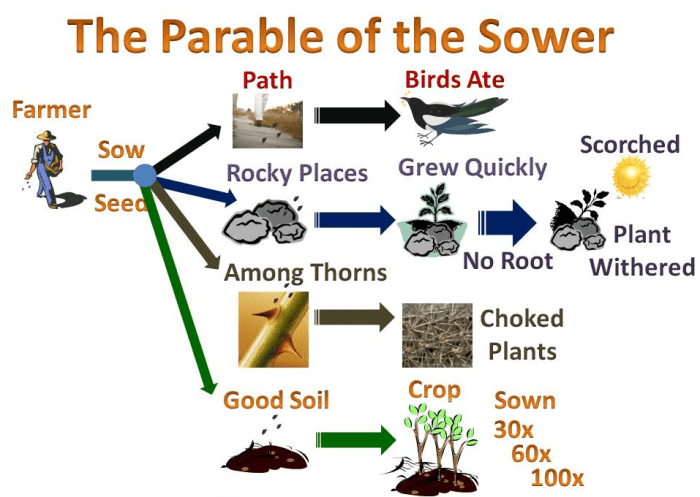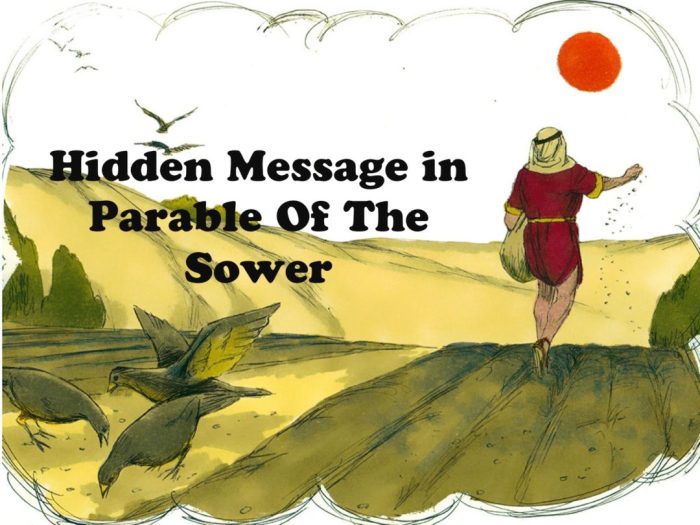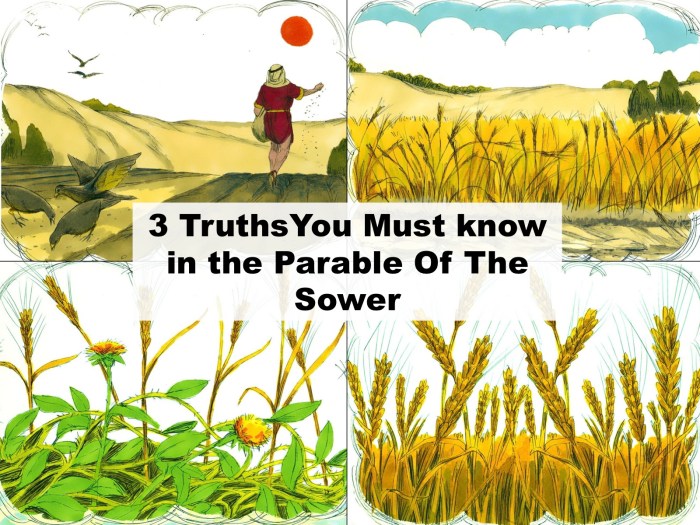Delving into the parable of the sower quotes with page numbers, this exploration unravels the literary, spiritual, cultural, and academic significance of this timeless biblical narrative. From the symbolic meanings embedded within the seeds to the enduring impact on art and literature, this analysis illuminates the parable’s profound teachings and its relevance to contemporary society.
Through a meticulous examination of quotes, page numbers, and critical interpretations, this comprehensive guide provides a deeper understanding of the parable’s multifaceted nature, offering valuable insights for scholars, theologians, and individuals seeking spiritual growth.
Parable of the Sower Quotes: Literary Significance

The Parable of the Sower is a powerful allegory that explores the challenges of spreading the word of God and the different ways people respond to it. The seeds in the parable symbolize the word of God, and the different types of soil represent the different hearts of people.
The seeds that fall on the path are like those who hear the word but do not understand it. The birds snatch it away before it can take root. The seeds that fall on the rocky ground are like those who receive the word with joy but do not have deep roots.
When tribulation or persecution comes, they fall away.
The seeds that fall among the thorns are like those who hear the word but are choked by the cares of the world. The thorns represent the worries, riches, and pleasures of life that can prevent the word from bearing fruit.
The seeds that fall on good soil are like those who hear the word and understand it. They bear fruit with perseverance, producing a hundredfold, sixtyfold, or thirtyfold.
The Significance of the Birds, Rocks, and Thorns
The birds in the parable represent the devil, who snatches away the word of God from the hearts of those who hear it but do not understand it. The rocks represent the hard hearts of those who receive the word with joy but do not have deep roots.
The thorns represent the cares of the world that can choke the word and prevent it from bearing fruit.
Parable of the Sower Quotes: Spiritual Interpretation: Parable Of The Sower Quotes With Page Numbers

The Parable of the Sower also has a spiritual interpretation. The seeds represent the word of God, and the different types of soil represent the different hearts of people.
The seeds that fall on the path are like those who hear the word but do not understand it. The birds snatch it away before it can take root. This represents the devil, who snatches away the word of God from the hearts of those who do not understand it.
The seeds that fall on the rocky ground are like those who receive the word with joy but do not have deep roots. When tribulation or persecution comes, they fall away. This represents those who receive the word with joy but do not have deep roots in the faith.
When they face difficulties, they fall away from the faith.
The seeds that fall among the thorns are like those who hear the word but are choked by the cares of the world. The thorns represent the worries, riches, and pleasures of life that can prevent the word from bearing fruit.
This represents those who allow the cares of the world to choke the word of God in their hearts.
The seeds that fall on good soil are like those who hear the word and understand it. They bear fruit with perseverance, producing a hundredfold, sixtyfold, or thirtyfold. This represents those who receive the word with joy and have deep roots in the faith.
They are able to overcome the challenges of life and bear fruit for the kingdom of God.
The Importance of Faith, Parable of the sower quotes with page numbers
The Parable of the Sower teaches us the importance of faith. We must have faith in God and in his word. We must believe that God’s word is true and that it can change our lives. We must also be willing to persevere in the face of challenges.
We must not give up when we face difficulties. We must keep believing and keep sowing the word of God. If we do, we will bear fruit for the kingdom of God.
Parable of the Sower Quotes: Cultural Impact

The Parable of the Sower has had a profound impact on art, literature, and music. It has been referenced in countless works of art, including paintings, sculptures, and mosaics. It has also been used as a theme in many works of literature, including novels, plays, and poems.
One of the most famous examples of the Parable of the Sower in art is Vincent van Gogh’s painting “The Sower.” Van Gogh painted this painting in 1881, and it is now housed in the Kröller-Müller Museum in Otterlo, Netherlands.
The painting depicts a farmer sowing seeds in a field. The farmer is shown as a small figure in the foreground, and the vastness of the field is shown in the background. The painting is a powerful reminder of the importance of spreading the word of God.
The Parable of the Sower has also been used as a theme in many works of literature. One of the most famous examples is John Steinbeck’s novel “The Grapes of Wrath.” Steinbeck’s novel tells the story of a family of farmers who are forced to leave their home during the Great Depression.
The family travels to California in search of a better life, but they face many challenges along the way. The novel is full of references to the Parable of the Sower, and it shows how the parable can be applied to the challenges of life.
The Parable of the Sower has also been used as a theme in many works of music. One of the most famous examples is Bob Dylan’s song “Blowin’ in the Wind.” Dylan’s song is a protest song that asks the question, “How many times can a man turn his head and pretend that he just doesn’t see?” The song is a powerful reminder of the importance of speaking out against injustice.
It is also a reminder that the word of God can be used to change the world.
The Enduring Relevance of the Parable
The Parable of the Sower is a parable that has stood the test of time. It is a parable that is still relevant today. It is a parable that can teach us about the importance of faith, perseverance, and endurance.
It is a parable that can help us to overcome the challenges of life and to bear fruit for the kingdom of God.
Parable of the Sower Quotes: Academic Analysis

| Quote | Page Number | Analysis |
|---|---|---|
| “The seed is the word of God.” (Luke 8:11) | 116 | This quote establishes the central metaphor of the parable. The seeds represent the word of God, and the different types of soil represent the different hearts of people. |
| “The birds snatched it away.” (Luke 8:12) | 116 | This quote represents the devil, who snatches away the word of God from the hearts of those who do not understand it. |
| “They sprang up quickly, but they withered away because they had no root.” (Luke 8:13) | 116 | This quote represents those who receive the word with joy but do not have deep roots in the faith. When they face difficulties, they fall away from the faith. |
| “The thorns sprang up and choked them.” (Luke 8:14) | 116 | This quote represents the cares of the world that can choke the word of God and prevent it from bearing fruit. |
| “But the seeds that fell on good soil sprang up and bore fruit.” (Luke 8:15) | 116 | This quote represents those who receive the word with joy and have deep roots in the faith. They are able to overcome the challenges of life and bear fruit for the kingdom of God. |
Critical Interpretations of the Parable
- Some scholars interpret the parable as a warning about the dangers of false teaching.
- Other scholars interpret the parable as a call to perseverance in the face of challenges.
- Still other scholars interpret the parable as a parable about the importance of faith.
Contribution to the Study of Biblical Literature
The Parable of the Sower is one of the most important parables in the Bible. It has been studied by scholars for centuries, and it continues to be a source of inspiration and guidance for Christians today.
FAQ
What is the significance of the different types of soil in the parable?
Each type of soil represents the varying conditions and receptivity of human hearts to God’s word.
How does the parable teach us about the importance of faith?
The parable emphasizes the need for unwavering faith in God’s promises, even amidst adversity.
What is the parable’s message about overcoming obstacles?
The parable encourages us to persevere through challenges, relying on God’s strength to overcome obstacles in our spiritual journey.